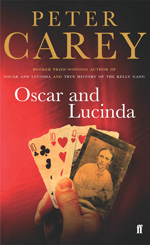
Hermione Lee
Oscar And Lucinda
The Observer, UK March 1988
A glass church, constructed out of segments, held together by a cast-iron frame, measuring 50 feet long and 22 feet wide, and weighing 12 tons, floats on a barge down a river in New South Wales in 1865. It is watched from the jungly banks with amazement, by hidden aborigines and drunken colonials. Sitting inside it is a red-headed clergyman from Devon, overcome by aquaphobia. He has reached this point, after a horrifying journey though the interior, because of a bet made with the woman he loves, whom he has completely misunderstood and will never see again.
The glass church is like the novel, a prodigious and enchanting invention, a gamble, a spectacular ‘folly’, a most unlikely tour de force. Like the church, the novel is built of segments – short chapters, bits of lives – which at long last interlock. Like the church, it is heavy – a great, fat, slow book, freighted down with the cast-iron of fact and history – but also light: fantastical, playful, buoyant.
The lives built of this fictional glass are, appropriately, both frail and tough. Oscar and Lucinda involves a national history and a family legacy – Oscar the narrator’s great-grandfather – and is much concerned with inheritance. But it is also a very peculiar love story, between two fanatical, unaccommodating misfits. Lucinda Plastrier is the daughter of a strong-willed English feminist, a kind of George Eliot (not very convincingly characterized) who has turned herself, after her gentle curious husband’s death, into an Australian farmer. The other has given Lucinda ‘one substantial gift – that she did not expect anything small from her life.” Orphaned at 18 she invests her inheritance in a glassworks, and shocks the narrow society of Victorian Sydney by consorting indiscriminately with clergymen and gamblers, and refusing to act like and unprotected girl.
Coming towards her along an unlikely trajectory is an equally passionate gambler, the Rev. Oscar Hopkins, whom the Church Missionary Society has sent out to bring the word of Christ to New South Wales. Oscar, pale, nervy, eloquent, odd, is the son of a famous naturalist, a member of the fundamentalist Plymouth Brethren. (The painful comedy of his childhood is lifted, with ingenuity and acknowledgements, from Edmund Gosse’s marvelous autobiography Father and Son.) Oscar has rejected his father’s fanaticism from the dismal training of Anglican foster parents, but, at Oriel, led astray by a day at the races, he has discovered his ruling vice. His deadly serious, absurd attempt to reconcile his addiction with the vocation (‘Our whole faith is a wager… We must gamble every instant of our allotted span’) sends him to the colonies, and thus to the coincidence of his meeting with Lucinda.
Their strange affinity develops though a series of marvelously extravagant, intense, tragic-comic scenes – the parting between Oscar and his father, his stormy night of cards with Lucinda, their reunion in a Sydney Chinese gambling den, their visit to the glassworks, his humiliating departure into the interior. Milling around them, with lavish vigor, are clergymen, businessmen, explorers, landladies, gamblers, glassblowers, all vertiginously detailed and emphatic.
The novel’s virtue is to make us mind, tenderly, about this awkward and ill-starred pair, even though they are brought so artificially together, and made to speak (‘on my behalf it would be best if we did not discuss the matter’) in stiff Victorian phrases. At the same timeOscar and Lucinda make a ferocious caricature of Australian history, doing for nineteenth-century British Colonial influence what Illywhacker did for the country’s twentieth-century dependence on America and Japan. Like Carey’s contemporary historical fabulists of the post-colonial world – Salman Rushdie, Timothy Mo, Michael Ondaatie – he can plunge in freely and make new shapes out of a great mass of rich material.
But like them, he must also find a way of treating terrible horror and violence. The attempt to Christianize what is ‘not a Christina landscape at all’ begins as a comedy, but ends in bitter outrage, as the white story is at last rewritten from the point of view (noticeably missing in Illywhacker) of the ‘blacks’. The two narratives are irreconcilable:
My great-grandfather drifted up the Bellinger River like a blind man up the central aisle of Notre Dame. He saw nothing. The country was thick with sacred stories more ancient than the ones he carried in his sweat-slippery leather Bible. He did not even imagine their presence. Some of these stories were as small as the transparent anthropods that lived in the puddles beneath the river casuarinas. These stories were like fleas, thrip, so tiny that they might inhabit a place (inside the ears of the seeds of grass) he would later walk across without even seeing. In this landscape every rock had a name, and most names had spirits, ghosts, meanings.
Carey’s passion for detail makes itself felt here, in this eloquent version of the ‘songlines’, as everywhere. He has a wonderful curiosity about things and their workings: phosphorescence, glass, celluloid, betting systems, ocean liners, clay pots, ink-mixing. Nothing goes unimagined: the pollen dust from a dead flower on an office desk, the colors of clay, the smell of seaweed. But, like glass, things seem not to be solid: they metapmorphose as you look at them: ‘Sydney Harbor had a silver skin. A cormorant broke the surface, like an improbable dream tearing the membrane between dreams and life.” So the novel, improbably triumphant keeps floating off from de??? realities to airy play.
Hermione Lee is a British critic, biographer and lecturer and Professor of English at the University of Oxford. The Novels of Virginia Woolf was published in 1977, She has also written critical studies of Elizabeth Bowen and Philip Roth. Her Woolf biography won the 1997 British Academy’s Rose Mary Crawshay Prize for English Literature.She was chair of the 2006 Man Booker Prize committee.
